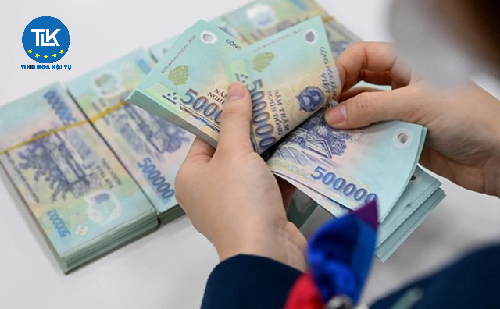According to Circular 31/2024/TT-NHNN, the classification of loans plays a crucial role in risk management and assessing the financial situation of customers. Specifically, for those who borrow through financial or banking applications, failure to repay the loan will result in it being classified as bad debt.
=> See more: Try to reduce lending interest rates to a reasonable level

Photo 1. In 2024, will failing to repay an online loan result in bad debt?_ Hotline: 097 211 8764
Pursuant to Article 3 of Circular 31/2024/TT-NHNN, the definition of bad debt is as follows:
“...
5. Bad debt (NPL) refers to bad debt accounted for in the balance sheet (on-balance sheet bad debt), which includes debt classified under groups 3, 4, and 5.
...”
Accordingly, Article 10 of Circular 31/2024/TT-NHNN regulates the classification of debts and off-balance sheet commitments using the quantitative method as follows:
“...
c) Group 3 (Substandard debt) includes:
(i) Debt overdue from 91 days to 180 days, excluding the debt specified in Clause 3, Article 10 of Circular 31/2024/TT-NHNN;
(ii) First-time restructured debt that is still within the term, excluding the debt specified in point b, Clause 2, Clause 3, Article 10 of Circular 31/2024/TT-NHNN;
(iii) Debt for which interest is waived or reduced due to the borrower’s inability to fully pay interest as agreed, excluding the debt specified in Clause 3, Article 10 of Circular 31/2024/TT-NHNN;
(iv) Debt that falls into one of the following cases and has not been recovered within 30 days from the date the bank or non-bank credit institution issues the debt recall decision:
Debt that violates the provisions of Clauses 1, 3, 4, 5, 6, Article 134 of the Law on Credit Institutions;
Debt that violates the provisions of Clauses 1, 2, 3, 4, Article 135 of the Law on Credit Institutions;
Debt that violates the provisions of Clauses 1, 2, 5, 9, Article 136 of the Law on Credit Institutions;
(v) Debt under the recovery period according to inspection or audit conclusions;
(vi) Debt subject to early recall by decision of the bank or non-bank credit institution due to the borrower’s breach of agreement and has not been recovered within 30 days from the date of the debt recall decision;
(vii) Debt classified as Group 3 according to Clauses 2, 3, Article 10 of Circular 31/2024/TT-NHNN;
(viii) Debt that must be classified into Group 3 according to Clause 4, Article 8 of Circular 31/2024/TT-NHNN.
d) Group 4 (Doubtful debt) includes:
(i) Debt overdue from 181 days to 360 days, excluding the debt specified in Clause 3, Article 10 of Circular 31/2024/TT-NHNN;
(ii) First-time restructured debt that is overdue up to 90 days based on the restructured repayment term, excluding the debt specified in Clause 3, Article 10 of Circular 31/2024/TT-NHNN;
(iii) Second-time restructured debt that is still within the term, excluding the debt specified in point b, Clause 2, Clause 3, Article 10 of Circular 31/2024/TT-NHNN;
(iv) Debt specified in point c(iv), Clause 1, Article 10 of Circular 31/2024/TT-NHNN that has not been recovered within 30 to 60 days from the debt recall decision;
(v) Debt subject to recovery according to inspection or audit conclusions that has not been recovered within 60 days after the recovery period specified in the conclusions;
(vi) Debt subject to early recall by decision of the bank or non-bank credit institution due to the borrower’s breach of agreement and has not been recovered within 30 to 60 days from the debt recall decision;
(vii) Debt classified as Group 4 according to Clauses 2, 3, Article 10 of Circular 31/2024/TT-NHNN;
(viii) Debt that must be classified into Group 4 according to Clause 4, Article 8 of Circular 31/2024/TT-NHNN.
e) Group 5 (Loss debt) includes:
(i) Debt overdue for more than 360 days;
(ii) First-time restructured debt that is overdue by 91 days or more based on the restructured repayment term;
(iii) Second-time restructured debt that is overdue based on the restructured repayment term;
(iv) Debt restructured for the third time or more, excluding the debt specified in point b, Clause 2, Article 10 of Circular 31/2024/TT-NHNN;
(v) Debt specified in point c(iv), Clause 1, Article 10 of Circular 31/2024/TT-NHNN that has not been recovered after 60 days from the debt recall decision;
(vi) Debt subject to recovery according to inspection or audit conclusions that has not been recovered after 60 days following the recovery period specified in the conclusions;
(vii) Debt subject to early recall by decision of the bank or non-bank credit institution due to the borrower’s breach of agreement and has not been recovered after 60 days from the debt recall decision;
(viii) Debt of credit institutions under special control or foreign bank branches whose assets and capital are frozen;
(ix) Debt classified as Group 5 according to Clause 3, Article 10 of Circular 31/2024/TT-NHNN;
(x) Debt that must be classified into Group 5 according to Clause 4, Article 8 of Circular 31/2024/TT-NHNN.”
Thus, if a borrower fails to repay loans from financial or banking applications and the loan is classified into groups 3, 4, or 5, the borrower will be considered as having bad debt.
Note: In the case of borrowing from unregulated or "black credit" apps, these loans are typically not reported to the CIC system. Therefore, failure to repay such loans will not result in the borrower being listed as having bad debt in the CIC system.
=> See more: Amending regulations on risk coefficients for residential mortgage loans

Photo 2. Free legal advice _ Hotline: 097 211 8764
Socio-Economic Summary Department - TLK Law Company Limited
Dear readers, TLK Law Company Limited, in addition to providing readers with useful intellectual information about economic, cultural and social life, we are also an organization providing legal services; Professional accounting - tax and trade promotion with many years of experience.
With the desire to fulfill social responsibility, if readers need advice on issues related to the Law, please contact us at hotline: 097 211 8764 to get advice from a lawyer. Direct consultation (completely free consultation).












